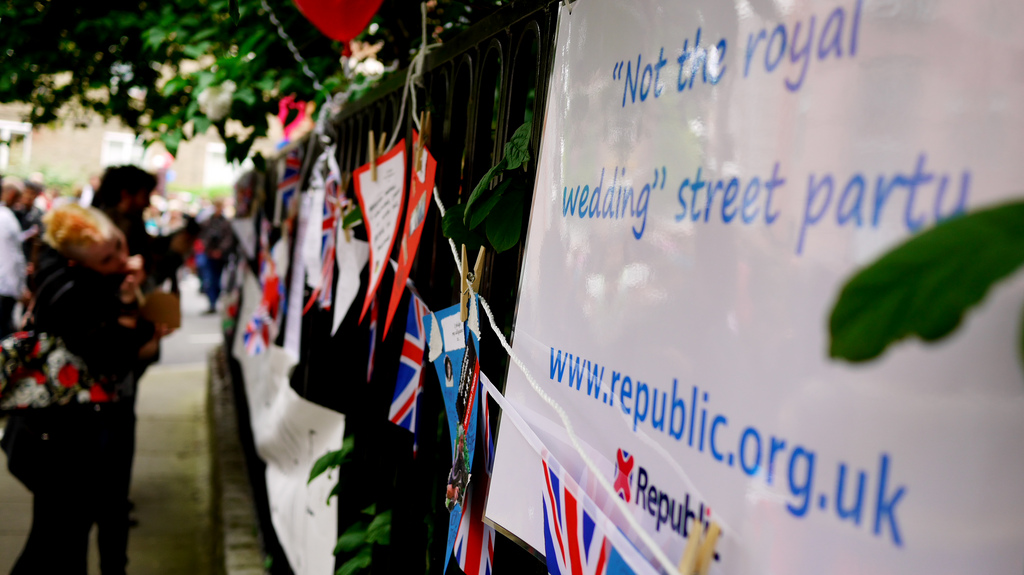On the day of the Royal Wedding in April 2011, police arrested several people in central London, some who were dressed as zombies.
The police thought they might try to disrupt the wedding causing a ‘breach of the peace’. However, after taking their appeal all the way to the Supreme Court the case was dismissed, the judges concluding that the police must be able to reasonably perform their duties.
The Zombie Picnic

The Starbucks four – Four people planned to go to a “zombie picnic” organised by a campaign group highlighting the effect of Government spending cuts on lesbian, gay, bisexual and transgender communities. But the group saw a large police presence and decided to leave.
They went into a Starbucks coffee shop on Oxford Street. Police asked them to step outside and they were searched. Nothing significant was found, but the four were still arrested and detained until the wedding was over. The police had heard that protesters dressed as zombies might try to disrupt the wedding party leaving Westminster Abbey.
JMC – JMC is ‘genderqueer’ and does not identify as male or female. They had planned to attend the zombie picnic with a friend, but left after seeing a lot of police and photographers.
As they walked away, photographers tried to take their picture, so the friends covered their faces. They were approached by police officers and asked why they had masked their faces. JMC explained, but the friends were arrested as the police believing that they intended to disrupt to the wedding. They were released once the wedding was over.
“Not the Royal Wedding” Street Party

Brian Hicks – Hicks was on his way to a “Not the Royal Wedding” street party, organised by a campaign group which calls for an end to British monarchy in favour of a republic (basically, a political system which puts power in the hands of elected representatives, rather than those of a monarch).
He was stopped and searched by a police officer. Nothing was found, but Hicks was arrested anyway – the police thought he might join with others and cause disruption to the wedding. Hicks was detained at a Police Station and released after the wedding was over.
The Charing Cross protesters – Nine people arrived at Charing Cross train station. They wanted to attend the “Not the Royal Wedding” street party but were stopped by British Transport Police. They were searched and found to be carrying a megaphone and placards bearing republican slogans. They were arrested, held at a police station and later released with no further action taken.
Were the arrests and detention lawful?

Everyone has the right to liberty and security of person. It is a human right protected under the European Convention on Human Rights (‘ECHR’), which is part of UK law through the Human Rights Act 1998. Under Article 5 of the ECHR, no one can be deprived of their liberty except on certain grounds and following a procedure established in law.
One ground on which someone may be deprived of liberty is the lawful arrest or detention of a person to bring them in front of a ‘competent legal authority’ (usually a court) on reasonable suspicion that they have committed a crime, or when it is reasonably considered necessary to prevent them from committing a crime (Article 5(1)(c) ECHR).
The Supreme Court decided, in this case, to throw out the appeal. While they acknowledged people should be protected from arbitrary detention, they said this shouldn’t make it “impractical” for the police to do their job.
The judges added that police would be “severely hampered” if they couldn’t lawfully arrest and detain a person for a “relatively short time” (this means when the time is far too short to take anyone to court). The Court concluded that early release from detention for preventive purpose would not breach the right to liberty if the lawfulness of the detention could be challenged later and decided on by a court.
You can read the full judgment here.
For more information:
- Read our explainer on the right to liberty and why it matters.
- Take a look at our infographic poster on the right to liberty.
- Subscribe to RightsInfo and follow us on Facebook and Twitter.







